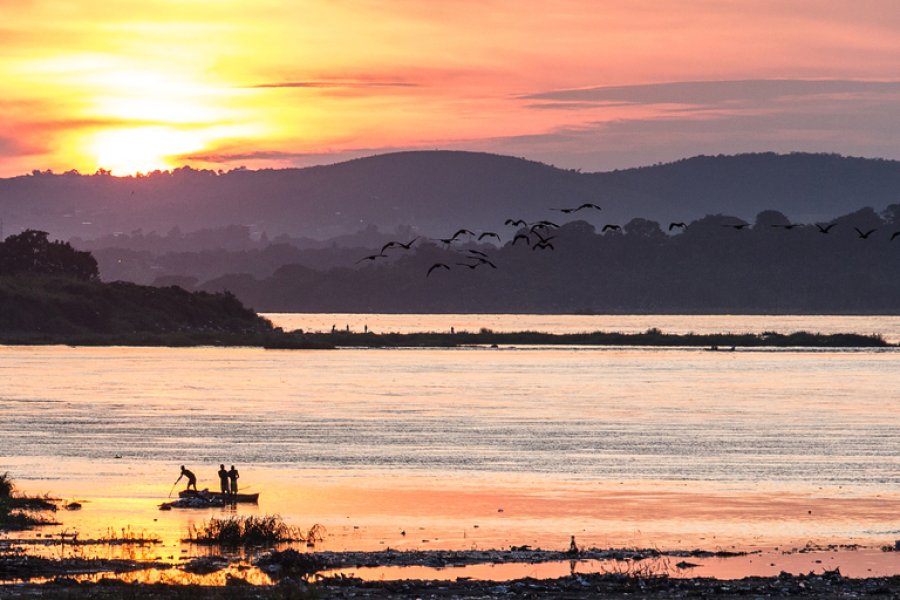What to see, what to do Democratic Republic Of The Congo?
The 10 good reasons to go Democratic Republic Of The Congo

Incredible variety of landscapes
A country with every possible landscape between sea level and 5.120 m.

A very welcoming population
Whether in town or in the bush, the Congolese are renowned for their great availability to visitors.

Traditional handicrafts
Tchokwé masks, Kasaian velvet, wood carvings, paintings, minerals, jewelry.

The enormous cultural diversity
A mosaic of peoples (450) and cultures that a lifetime would not be enough to discover!

Noise and silence
Urban decibel (music, preaching, palaver, horns, baffles) rubs shoulders with rural tranquillity

So much water, so much water...
A mythical 4,700 km river with tributaries and waterfalls that feed it.

A cuisine of nature
Fruits, vegetables, fish, bush meat are the basis of diversified and healthy dishes.

Weather of seasons
Summer temperatures all year round, with alternating sun and rain.

Ambiance corridors
A succession of open-air bars with music, dancing, drinks, grills and beer.

Species unique in the world
Hundreds of plant and animal species found nowhere else.
What to visit Democratic Republic Of The Congo?

Interview: My Congo DRC
By Philippe Wyvekens
Like so many of his compatriots, Philippe Wyvekens is a genetic carrier of a bit of this exceptional country, which he first discovered in 2006. From north to south and east to west, often with Médard Tambwe, his local partner, and Caroline Thirion, who dreads nothing more than rest, he has explored the country in every direction, and particularly appreciates the good-natured, welcoming nature of the Congolese people.
See the video of the interviewGood to know to visit Democratic Republic Of The Congo
 Timetable
Timetable
Most tourist sites open between 9am and 4/5pm. The busiest times are weekends and public holidays.
 To be booked
To be booked
It depends on the site, but most are only accessible with a reservation. Make your reservations well in advance. Check with a tourist agency or the ICCN beforehand, as some sites are only accessible by appointment and require official authorization to visit the Inga hydroelectric power station.
 Budget & Tips
Budget & Tips
The DRC relies heavily on its nature tourism, which takes place mainly in parks and reserves. In addition to the price of entry, don't forget the cost of access (plane, car). If you avoid international hotels and restaurants, it's possible to eat and stay at a good price. Negotiating is always an option. The bulk of the budget is spent on sightseeing and travel.
Generally speaking, nationals have a preferential price. But this is often done on a "customer pays" basis, so black foreign visitors are likely to pay the lowest price!
 Main events
Main events
There are relatively few festivals or recurring events, and these generally revolve around culture, dance and music. Every year: DRC Mining Week in Lubumbashi, Kimvuka Festival, Amani Festival in Goma, Gungu Festival. Religious festivals are important locally.
 Guided tours
Guided tours
Unavoidable in parks and reserves where the guides are generally very competent. They know the places perfectly and will take you safely to the right places at the right times for maximum discovery. For city and museum visits, take an official guide or make sure your guide has some real knowledge. Museums are closed on Sundays.
 Smokers
Smokers
Congolese don't smoke much. You can smoke in most restaurants and bars, but it's forbidden in administrations, banks and public places in general.
 Tourist traps
Tourist traps
The official guides are generally those of ICCN. However, it's not uncommon to come across a "providential" guide at the entrance to or around a site, who will offer to accompany you on your tour. If there's no alternative and the person seems to know the subject, why not.
It's still common practice to try and ban photography. Some people, without even the slightest warrant, don't hesitate to be overzealous in this respect, asking that photos be deleted or that a fine be paid... For several years now, except in so-called strategic locations (airports, government offices, official monuments), it has been officially permitted to take photos anywhere. While respecting the privacy of individuals, of course.















